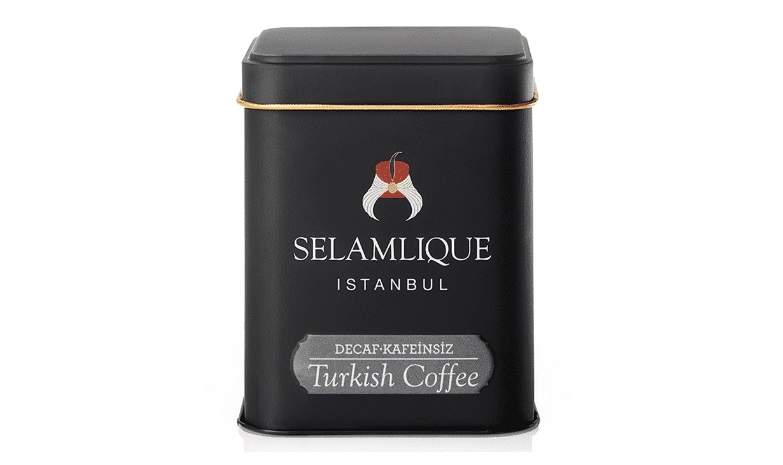
Decaf Turkish Coffee is a delightful twist on the traditional Turkish coffee, offering the same rich flavor and cultural essence without the caffeine buzz. This version caters to those who are sensitive to caffeine or prefer their coffee milder, especially later in the day or at night.
The history of Turkish coffee stretches back centuries, deeply intertwined with Turkey’s culture, symbolizing hospitality and friendship. This decaffeinated variant maintains the traditional preparation and serving methods, preserving the cultural authenticity while providing a more inclusive beverage option.
Key Takeaways
- Taste Profile: Decaf Turkish Coffee retains the signature intense flavor and thick texture of its caffeinated counterpart. The taste is rich, often with hints of chocolate, caramel, and toasted bread, offering a satisfying experience for coffee lovers.
- Swiss Water® Technique: This method is a chemical-free process used to decaffeinate coffee, ensuring that the coffee’s natural flavors are preserved while removing caffeine. It’s a preferred method for many, as it maintains the coffee’s depth and character.
- Diverse Brands: A variety of brands now offer Decaf Turkish Coffee, catering to different taste preferences. From established Turkish coffee producers to new, artisanal brands, there’s a wide selection available, each with its unique take on this traditional beverage.
The Making of Decaf Turkish Coffee
Creating a cup of Decaf Turkish Coffee is an art that blends tradition with the preferences of those who avoid caffeine. The process begins long before the coffee reaches your cup, starting with the Swiss Water® decaffeination process. This method is 100% chemical-free, using only water to gently remove caffeine while preserving the coffee’s original flavors and aromas.
Swiss Water® Decaffeination Process
The Swiss Water® Process is a gentle, natural way to decaffeinate coffee. It involves soaking the beans in hot water to dissolve the caffeine, then passing the water through a charcoal filter to remove the caffeine. This process is repeated until the beans are 99.9% caffeine-free. The beauty of this method is that it doesn’t compromise the coffee’s integral flavors, ensuring that your decaf Turkish coffee is as rich and robust as the traditional version.
Ingredients and Equipment
To brew authentic decaf Turkish coffee, you’ll need a few key ingredients and pieces of equipment:
- Ingredients: High-quality decaf Turkish coffee grounds, water, and sugar (optional).
- Equipment: A cezve (a traditional Turkish coffee pot), a heat source, and a small coffee cup.
Brewing Guide
- Measure: Start by measuring your water and coffee. The rule of thumb is one heaping teaspoon of coffee per Turkish coffee cup of water.
- Combine: Place the coffee grounds and water (and sugar if you prefer) in your cezve.
- Heat: Slowly heat the mixture over low to medium heat. Stir gently until the sugar dissolves if you’re using any.
- Watch: Keep an eye on the coffee. As it heats, it will start to froth. Just before it boils over, remove it from the heat.
- Serve: Pour the coffee into your cup, allowing the grounds to settle at the bottom. The foam should be divided equally among the cups if serving multiple people.
Brands and Options
When it comes to Decaf Turkish Coffee, two brands stand out: Kurukahveci Mehmet Efendi and Selamlique. Both offer a taste of tradition without the caffeine, each with its unique approach to preserving the rich flavors we associate with Turkish coffee.
Kurukahveci Mehmet Efendi is renowned for its quality and tradition. Their decaf option maintains the brand’s signature depth and aroma, providing a classic experience without the buzz.
Selamlique specializes in luxury, offering a refined take on decaf Turkish coffee. Their blends are known for their sophisticated flavor profiles, catering to those who enjoy a gourmet coffee experience.
Exploring different blends and flavors can be a delightful journey. Some blends might introduce a hint of spice or a touch of sweetness, enhancing the coffee’s natural richness. When selecting your decaf Turkish coffee, consider what flavor notes appeal to you most—whether you prefer a bold, full-bodied brew or something lighter and subtly nuanced.
Health Aspects of Decaf Turkish Coffee
Opting for decaf doesn’t just affect your caffeine intake; it can have broader health implications. For many, decaf is the preferred choice to avoid the potential restlessness and disrupted sleep patterns associated with caffeine.
Benefits of Decaf: Decaf offers a way to enjoy coffee’s social and cultural aspects, along with its antioxidants, without the potential downsides of caffeine. For those sensitive to caffeine, decaf can be a comforting alternative that allows for a coffee experience without the agitation or jitters.
Addressing Myths: It’s important to debunk common myths surrounding decaf coffee. Some believe decaf lacks the full range of health benefits of regular coffee, but decaf retains most of the antioxidants found in its caffeinated counterpart. Moreover, the decaffeination process has evolved, with methods like the Swiss Water® Process ensuring that the coffee’s beneficial compounds remain intact.
Cultural Context and Variations
Turkish coffee isn’t just a beverage; it’s an integral part of Turkey’s cultural fabric, symbolizing hospitality, friendship, and tradition. Serving coffee in Turkey goes beyond mere consumption—it’s a gesture of welcome and a way to forge connections. Historically, coffee has played a pivotal role in social rituals, from marriage proposals to daily gatherings.
In Turkish culture, the preparation and consumption of coffee follow a ceremonial rhythm, where every step, from grinding the beans to sipping the coffee, is infused with meaning. The traditional brewing method, using a cezve and serving in small cups, is a testament to the coffee’s importance in daily life and special occasions.
While the essence of Turkish coffee remains constant, regional variations add a unique flavor to this tradition. Each region in Turkey may have its own twist on the classic recipe, incorporating local tastes and preferences, showcasing the country’s diverse cultural landscape.
Modern interpretations of Turkish coffee also reflect changing tastes and global influences. For instance, decaf Turkish coffee caters to contemporary health-conscious consumers, offering the beloved taste without the caffeine. Innovations like Kurdish Menengiç coffee, made from wild pistachio, provide a caffeine-free alternative that still resonates with the rich, communal spirit of Turkish coffee culture.
FAQs
How do you prepare Decaf Turkish Coffee?
The preparation of Decaf Turkish Coffee is similar to the traditional method: combine water and finely ground decaf coffee in a cezve, heat gently, watch for the foam, and serve after the grounds settle. The key is using a fine grind and not letting the coffee come to a boil.
What are the health benefits of Decaf Turkish Coffee?
Decaf Turkish Coffee offers a way to enjoy the rich taste and cultural experience of Turkish coffee without the caffeine, reducing risks associated with caffeine sensitivity such as disrupted sleep or anxiety.
Are there any recommended brands for Decaf Turkish Coffee?
Brands like Kurukahveci Mehmet Efendi and Selamlique are popular choices. They provide high-quality decaf options that maintain the traditional flavors of Turkish coffee.
Final Thoughts
Decaf Turkish Coffee is a testament to the adaptability of traditional beverages in meeting modern lifestyle choices. It offers the same rich, immersive experience as regular Turkish coffee but without the caffeine, making it suitable for a broader audience. Whether you’re new to Turkish coffee or a seasoned aficionado, exploring decaf options can add a new dimension to your coffee routine.









